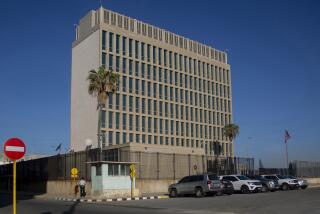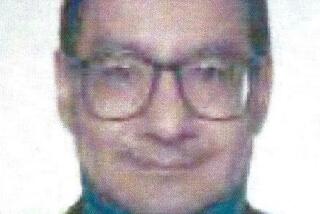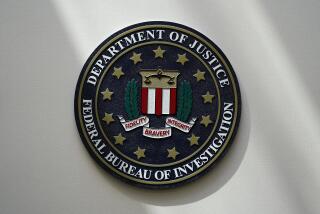Analysis: Cuba still faces domestic challenges in pursuing U.S. thaw
It was a handshake a year ago at Nelson Mandela’s funeral, and this week it was a long phone call.
President Obama and his Cuban counterpart, Raul Castro, have taken the strongest steps ever toward ending more than half a century of antagonist relations between their nations.
The decision to reopen diplomatic ties -- negotiated between the two leaders with pushes from Canada, a Vatican led by a Latin American pope, and others -- could lead to a remarkable and historic shift in hemispheric dynamics.
But the thaw will not come overnight. Cuba’s government remains nervous about change -- its military, especially, intent on maintaining control over domestic developments and the opening-up of politics and the economy.
Still, Cuba has an increasingly savvy newer generation, a small crop of enthusiastic entrepreneurs and a pressing need for access to global markets and aid that can serve as impetus for movement.
“When you’ve been waiting for 55 years for something like this, this is huge, significant and a game-changer,” said Ted Henken, a Cuba expert at the City University of New York.
At first glance, the prisoner releases that took place Wednesday benefit each country enormously and in different ways. Americans can welcome the return of Alan Gross, a little-known subcontractor for the U.S. Agency for International Development who says he was distributing computers, which is illegal in Cuba.
Cuba is receiving the last three of five men, the so-called Cuban Five, who are regarded as heroes. The five intelligence officers were arrested in 1998 in Miami by the FBI and convicted three years later by a federal jury on charges of acting as illegal foreign agents and conspiring to obtain military secrets from U.S. Southern Command headquarters in Miami.
Cuba says they were in fact counter-terrorism agents, acting to find information on extremist anti-Castro Cuban exiles operating in Miami who planned to attack Cuba.
One of the five, Gerardo Hernandez, portrayed as the group’s leader and who arrived in the U.S. as an immigrant, was also found guilty of conspiracy to commit murder in the deaths of four pilots from a Miami-based exile organization who were shot down by Cuban fighter jets in 1996. Two of the five were previously released after serving their sentences and returned home.
The five have long been a cause celebre in Cuba, where they are hailed as freedom fighters unfairly imprisoned by the U.S. Their images appear on billboards all over Havana and greet travelers at the city’s international airport.
And so, for Castro, their return is an important victory, one that he can parlay into positive outreach to the U.S. without angering his government’s hard-liners, whose force remains strong.
Other factors may be pushing Castro. Cuba nearly two decades ago lost its principal sponsor with the fall of the Soviet Union and was plunged into devastating economic crisis. In the early 2000s, it found a generous ally in Venezuelan President Hugo Chavez, who supplied cheap oil and helped keep the country afloat. Even with Chavez’s death last year, his successor, Nicolas Maduro, has maintained the financial friendship.
But Venezuela now is in its own abysmal crisis, with the fall of oil prices further inhibiting its ability to help Cuba or any other country.
Perhaps more important than that, however, is Castro’s timetable. At 83, and having announced plans to step down in 2018, Castro has long insisted that he was willing to free Gross and open up to American diplomacy, as long as the Cuban Five were freed. Most of the potential Castro successors come from the same milieu of Communist Party and military hierarchy that has long ruled the island, although some have a more open worldview, several analysts said.
Castro’s tight-wire balance between hard-liners and reformers in his government has never threatened his power but could undermine efforts at long-term change.
“He would like to see the situation with the United States resolved before he leaves,” said Philip Peters, who heads the Cuba Research Center, a U.S.-based think tank. Castro makes most changes according to Cuba’s agenda and less at U.S. insistence, Peters said.
On Wednesday, Castro, in an olive-green military uniform, went on national television at midday to announce the prisoner releases as part of what he called the possible advent of significantly better relations with the United States.
Extolling the virtues of nearly 56 years of revolution, Castro nevertheless praised Obama’s overture as deserving of “the respect and recognition of our people.”
Despite the progress, he said, “it does not mean the basic issues have been resolved.” The U.S. embargo, which Cubans refer to as a blockade, has not been lifted despite enormous damage to the Cuban people and economy, Castro said.
“It must end,” he said.
Since he assumed power in 2006 to take over for his ailing brother, revolutionary leader Fidel Castro, Raul Castro has slowly ordered important changes that ushered in a modicum of economic freedom by allowing limited private enterprise by small businesses such as restaurants, hair salons and car washes. Cubans could, after many decades of prohibition, buy and sell cars and real estate.
More important, he loosened the rules for travel, eliminating a requirement that Cubans obtain an exit visa. For the first time since the early years of the revolution, even dissidents could leave and return without punishment.
But Internet access, the right to protest and other freedoms remain restricted. Political liberties have not gone hand in hand with economic openings.
The diplomatic ties announced Wednesday will inevitably lead to more U.S. investment in Cuba, something desired by parties on both sides of the Florida Straits. But don’t expect McDonald’s on every corner any time soon.
“I don’t think we are going to see broad-based American investment on the island day after tomorrow,” Julia Sweig, a Council on Foreign Relations expert on Cuba, said in a conference call.
Removing the United States as the the nation’s ultimate boogeyman and scapegoat for all its troubles might force the Cuban government to acknowledge its mishandling of domestic policies and empower civil society, Peters said.
“It might force them to examine the Cuban embargo against its own people,” he said. “Why don’t Cubans have access to Internet? Why don’t they have access to what they produce?”
There had been growing expectation among experts on Cuba that Obama would make a major move on restoring relations with Havana at some point after the U.S. midterm election in November and before a Pan-American summit in April. The oft-excluded Cuba has been invited to the meeting at the insistence of the rest of Latin America, and Obama will inevitably be forced to deal with Castro there.
It is unclear what, if any, further steps the U.S. will be able to expect from Cuba. In fact, some experts have recommended that the Obama administration act unilaterally and not be held hostage to actions by the unpredictable Castro government.
The United States has long been the last man standing in formally shunning Cuba. It is the only major country without full diplomatic relations with the island.
Follow @TracyKWilkinson on Twitter for more news from Latin America
More to Read
Start your day right
Sign up for Essential California for news, features and recommendations from the L.A. Times and beyond in your inbox six days a week.
You may occasionally receive promotional content from the Los Angeles Times.







